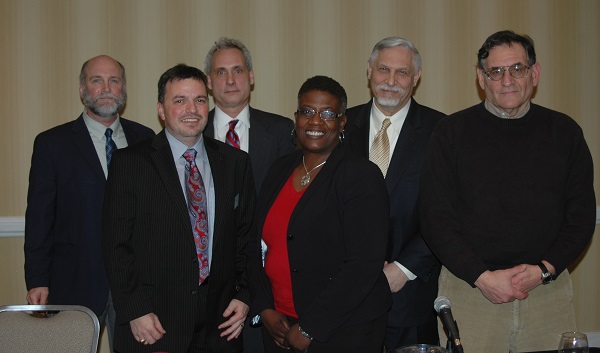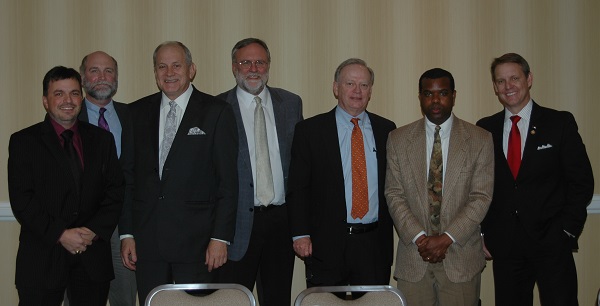NC WARN is working with the conservative John Locke Foundation. The two nonprofits agree that increased competition in the North Carolina electricity market would help customers benefit from the rapid changes occurring in the U.S. electricity marketplace.
NC WARN and the Locke Foundation sponsored two public forums. The first was held on February 26. The topic was “The Competitive Challenges to N.C.’s Monopoly Electricity Model.” The second, on March 20, was titled “The Prospect of State Mandated Consumer Financing of Power Plants.”
Read our news release about the collaboration.
Read the Locke Foundation news release.
Read the article in Indy Week: “A movement emerges against the Duke Energy-Progress monopoly”.
Listen to NC WARN’s Jim Warren and the Locke Foundation’s Jon Sanders on The State of Things.
Read an op-ed by Warren and Sanders in the News & Observer.

Participants in February 26 forum, from left: Jim Warren, Jon Sanders, Shawn LeMond, Satana Deberry, David Schnare and Mark Cooper
Forum #1: The Competitive Challenges to N.C.’s Monopoly Electricity Model
Participants in the forum were:
Jon Sanders, John Locke Foundation
Jim Warren, NC WARN
Dr. David Schnare, Thomas Jefferson Institute for Public Policy
Shawn LeMond, Sustainable Energy Community Development Co., LLC
Satana Deberry, NC Housing Coalition and
Mark Cooper, Vermont Law School
See a flyer for the February 26 forum.
See PowerPoint presentations made by
Shawn LeMond and
Mark Cooper.
Forum #2: The Prospect of State Mandated Consumer Financing of Power Plants
This forum addressed Construction Work in Progress (CWIP) laws that force customers to pay in advance for the construction of power plants, even if they never open.

Participants in the March 20 forum, from left: Jon Sanders, Jim Warren, Jim Clarkson, John Runkle, Bob Orr, Ivan Penn and Rep. Mike Hager
Participants, in addition to Jim Warren of NC WARN and Jon Sanders of the Locke Foundation, were:
Bob Orr (moderator), former NC Supreme Court Justice, former Executive Director of the NC Institute for Constitutional Law, presently of counsel with Poyner & Spruill
John Runkle, Attorney for NC WARN
Jim Clarkson, President, Resource Supply Management, Sumter, SC
Ivan Penn, Tampa Bay Times reporter and
Rep. Mike Hager, Chair, Public Utilities Committee, NC House of Representatives
Background on CWIP
Legislation forcing customers to pre-pay for power plants goes by various names. Technically called Construction Work in Progress, or CWIP, it’s also called “advance payment” and “pay as you go.”
Last year in Florida, Duke Energy cancelled a nuclear construction project in Levy County and handed customers a bill for $1.5 billion. That was allowed due to the same CWIP legislation Duke insists it must have before attempting to build nuclear plants in the Carolinas.
In 2007, the NC legislature passed partial CWIP legislation in a controversial scheme that attached it to a bill promoting renewable energy.
Later, Duke publicly insisted it cannot attempt to build nuclear plants without an additional CWIP provision allowing virtually automatic, annual rate hikes without full rate proceedings before the Utilities Commission.
In recent years Duke has been working the NC legislature – mainly behind the scenes – trying to line up support for full CWIP. Duke CEO Lynn Good recently indicated that she will not attempt to build new nuclear plants in the Carolinas without full CWIP. But no formal bill has been introduced yet because Duke has been unable to line up sufficient votes.
Four years ago, NC WARN co-founded a broad alliance of nonprofits called Consumers Against Rate Hikes (CARH) to persuade lawmakers not to follow the failing path CWIP is blazing across Florida, Georgia and South Carolina. CARH has dubbed the proposed North Carolina legislation the “Annual Rate Hike Bill.”
In Georgia and South Carolina, nuclear construction projects are underway but are suffering delays and ballooning costs. SCE&G customers have been hit with six rate hikes to pay for the VC Summer nuclear project that is years away from a very dubious completion.
CWIP has long been a non-partisan issue in North Carolina. Alert leaders from across the political spectrum realize that all customers and the state economy would get soaked by the legislation. CARH polling shows that overwhelming majorities of all voters oppose being forced to pre-pay for power plants.
CWIP and the absence of competitive markets both lead to higher prices for all electricity consumers, but the impact hits low- and moderate-income residential users especially hard. Energy costs eat up a larger portion of those customers’ paychecks.
CWIP is a key emblem of North Carolina’s failed monopoly system of electricity. Only in monopoly utility states are corporate utilities able to shift financial risks of building power plants onto customers, and to stifle competition and innovative technologies.





